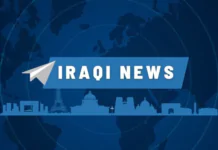From Washington: A New Banking And Economic Reform Package For Iraq
Energy and Business Iraq Banks Repairs 2025-10-18 Shafaq News – Washington The Iraq delegation participating in the banking reform conference in Washington, D.C., on the sidelines of the International Monetary Fund and World Bank meetings, announced a new package of banking and economic reforms on Saturday aimed at strengthening the stability of the financial system and attracting investment.
“The government has implemented a series of steps as part of the economic and financial reform program, most notably the implementation of comprehensive strategic banking reforms in cooperation with the Central Bank of Iraq and international consulting firms, as well as the preparation of a three-year budget for the first time in Iraq’s history to ensure stable financial planning that attracts investment,” said Saleh Mahoud Salman, an advisor to the Iraqi Prime Minister, according to a statement received by Shafaq News Agency.
He added that “automating the customs system through the implementation of the United Nations ASYCUDA program has led to a significant increase in customs and tax revenues, the restructuring of government banks (Rafidain, Rasheed, Industrial, and Agricultural) and Increased their operational efficiency, as well as the expansion of electronic payment systems and increased financial inclusion from less than 10% to more than 40% within two years.”
Salman continued, “Support programs have been launched for small and medium-sized enterprises to create job opportunities and stimulate the local economy,” noting that
“these steps represent a pivotal stage in the economic reform process, and that the government will continue to support the development of the banking sector in cooperation with international institutions.”
Prior to this, the Central Bank of Iraq announced new instructions to all authorized banks in the country regarding money transfers and customs clearance procedures related to the requirements for the approval of special commercial invoices, with the aim of curbing currency smuggling.
This measure comes as part of the efforts of the Central Bank of Iraq and government agencies to develop the financial and administrative environment and improve the level of oversight and compliance with international standards in foreign trade.
https://shafaq.com/ar/اقتصـاد/من-واشنطن-حزمة-صلاحات-مصرفية-واقتصادية-جديدة-للعراق
Washington Listens To Baghdad: Ambitious Financial Reforms Seek Credible Implementation And Institutional Change.
Economy / Special Files Yesterday, | 1492 Is the world convinced? Baghdad Today – Baghdad This week, the Iraqi delegation participated in a banking reform conference held in Washington on the sidelines of the IMF and World Bank meetings.
The event is a practical test of Baghdad’s ability to present a realistic picture of the results of its economic program.
The Iraqi delegation, which included a number of advisors and financial officials, sought to highlight the reform steps achieved over the past two years as indicators of the country’s transition from crisis management to building a modern economic system.
Advisor to the Prime Minister, Saleh Mahoud Salman, who presented Iraq’s paper at the conference, outlined a series of measures he described as “a pivotal stage in the path of economic and financial reform.”
He explained that the government is “implementing a strategic banking reform package in cooperation with the Central Bank and international consulting firms,” focusing on “restructuring government banks, expanding financial inclusion, and automating the customs and tax system.”
However, this proposal, while important from an administrative perspective,opens the door to broader questions about the depth of the transformation and its compatibility with the requirements of the rapidly evolving global economy.
Reform in a financial environment like Iraq, where structural challenges intersect with political constraints, is measured not so much by the number of projects as by the state’s ability to change the behavior of the financial system itself.
Indicators Of Reform… But To What Extent?
The government says the preparation of a three-year budget represents a qualitative shift in financial planning an unprecedented step in the modern history of Iraq.
However, financial economists point out that the success of this model depends on the availability of accurate data and stable monetary policy, two conditions that still face challenges in a financial environment that relies on oil revenues for more than 90% of the country’s GDP.
Institutional economists believe that “budget stability does not necessarily mean stable growth,” as volatility in oil prices and weak economic diversification make any long-term planning vulnerable to disruption in the event of a global crisis or a decline in demand for crude oil.
In contrast, the Prime Minister’s advisor points out that the government has been able to increase customs and tax revenues by automating the customs system using the UN-approved ASYCUDA program, which reflects the beginning of bridging the gap between the formal and parallel economies.
However, economic researchers believe that the success of this step requires an effective regulatory system and a flexible administrative structure, as technology alone is not sufficient to change work culture or reduce administrative corruption, which is one of the most prominent obstacles to financial reform in Iraq.
Financial Inclusion And Digital Transformation: Between Ambition And Capability
Electronic payment systems are one of the areas that have witnessed the most tangible progress, with financial inclusion rising from less than 10% to more than 40% in two years, according to the government advisor.
This digital leap is an indicator of a gradual shift in citizens’ financial behavior, especially with the expanding use of bank cards and mobile payment services.
However, banking observers believe that the quantitative expansion is not matched by qualitative developments in the banking structure.
Banking services in most government banks remain traditional and rely on paper transactions, while the private sector suffers from restrictions in accessing external financing.
Digital economy experts point out that the transition to an e-economy cannot be complete without a comprehensive legal and legislative environment that ensures protection from financial crimes and builds trust between citizens and the banking system.
Some economists argue that Iraq, despite its relative progress in this area, is still in the “experimental” phase and needs to integrate technology into the public financial management system, not just into individual transactions.
Banking Sector Restructuring: Reform or Role Rotation?
Restructuring state-owned banks (Rafidain, Rashid, Industrial, and Agricultural) is a key pillar of the government’s plan.
The government announces that it has increased the operational efficiency of these banks and begun reevaluating their assets.
However, financial analysts believe that true reform cannot be achieved simply through administrative restructuring, but rather through the ability of these institutions to transform into sustainable financing entities that effectively contribute to driving local production.
Rafidain and Rashid, which represent approximately 80% of the banking market, still operate according to a traditional services model, while private banks face weak confidence from investors and depositors alike.
Banking finance experts point out that structural reform in the Iraqi banking sector requires gradual liberalization of credit policies and the activation of partnerships with regional banks, as a closed economy cannot benefit from global growth or external financing.
Poor Institutional Continuity And Changing Strategies
One of the most significant structural challenges facing economic reform in Iraq is the lack of institutional continuity.
Each new government tends to reformulate the economic strategy from scratch, even in areas where tangible progress has been made.
This recurring pattern of “administrative rupture” hinders the accumulation of experience and leads to a loss of the institutional foundation necessary for any genuine reform process.
Instead of building on previous programs and evaluating their results, plans are replaced by new projects presented under a different title, without any scientific review or analysis of previous policies.
Institutional economics researchers point out that this behavior reflects the weakness of the Iraqi state’s institutional structure, as there are no permanent planning bodies or economic councils to ensure the continuity of policies regardless of changes in government.
Thus, the reform process often becomes a short-term political project, tied to the government’s cycle rather than the economic cycle, limiting its ability to produce a sustainable economic impact or build internal and external confidence in fiscal policies.
Are these steps sufficient to keep pace with global transformations?
Iraq’s experience with financial and banking reform demonstrates that the problem has never been a lack of vision, but rather its frequent interruptions.
Each government introduces new plans, discarding previous ones, as if the state is starting from scratch with each political cycle.
This behavior reflects not only a contradiction in priorities, but also a weak institutional structure that lacks a continuous economic memory capable of transferring experience and embedding successful policies.
Public economics studies confirm that the success of any financial reform depends more on accumulated experience and continuity than on the amount of funding or international support.
In the Iraqi case, reforms are still managed according to the logic of the “governmental phase” rather than the “national phase,” which makes them vulnerable to disruption as soon as the political orientation shifts.
The steps presented at the Washington conference reflect a clear technical effort, but they will not translate into actual achievement unless they are linked to independent institutions capable of protecting reform from political change.
Reform is not achieved by changing plans, but rather by establishing an implementation mechanism that is not affected by changes in ministers or governments.
Thus, it can be said that financial reform in Iraq is moving in the right direction in terms of form, but it still requires a permanent institutional framework that ensures sustainability and transforms reform from a government initiative into a state-led process that remains unchanged by changes in leadership.
https://baghdadtoday.news/285426-.html
The Central Bank Issues New Instructions Regarding Money Transfers And Customs Clearance.
Saturday, October 18, 2025 | Economic Number of readings: 285 Baghdad / NINA / The Central Bank of Iraq issued new instructions to all authorized banks in the country regarding financial transfers and customs clearance operations, as well as the requirements for approving special commercial invoices.
According to a document issued by the Central Bank, it has decided to include a set of basic information in commercial invoices, including:
shipping and payment terms,invoice value and currency, theGlobal Harmonized System of Customs (GHS) code, in addition to theimporter and exporter addresses, aprecise description of the goods, their origin, brand, quantity and unit of measurement, and unit and total price.
The circular stipulated that the final commercial invoice, or the preliminary invoice attached to the sales contract, should be approved, provided that the final invoice contains all preliminary data.
It stated that the implementation of these instructions will begin on November 1, 2025.
He explained: “The aim of the decision is to regulate foreign financial transfers and enhance transparency and accuracy in customs clearance within the national automation project,” noting:
“This step has several positives, most notably enhancing the standardization of procedures and reducing errors in commercial transactions, in addition to supporting the customs automation project.” /End 8
https://ninanews.com/Website/News/Details?key=1257561
New Instructions From The Central Bank Of Iraq To Prevent Dollar Smuggling Starting Next Month (Document)
Energy and Business dollar Central Bank directions
New instructions from the Central Bank of Iraq to prevent dollar smuggling starting next month (document) WeQ2gAqKuM3LQAAAABJRU5ErkJggg==
2025-10-17 23:22 Shafaq News – Baghdad On Saturday, the Echo Iraq Observatory revealed new instructions issued by the Central Bank to all authorized banks in the country regarding financial transfers and customs clearance procedures related to the requirements for approving special commercial invoices.
The Observatory said in a statement received by Shafaq News Agency, “The Central Bank, in Circular No. (267/4/9) dated 10/15/2025, decided to include in commercial invoices a set of basic information, including: shipping and payment terms, value and invoice currency, and the Global Harmonized System of Classification and Labelling of Goods (GHS) code,” adding, “As well as the addresses of the importer and destination, an accurate description of the goods, their origin, their trademark, quantity and unit of measurement, and the unit and total price.”
He explained that “the circular stipulates that one of the following invoices must be approved: the final commercial invoice, or the preliminary invoice attached to the sales contract, provided that the final invoice contains all the data of the preliminary invoice.”
According to Echo Iraq, “these instructions will be implemented starting November 1, 2025,” noting that “the aim of the decision is to regulate foreign financial transfers and enhance transparency and accuracy in customs clearance as part of the national automation project.
” The Observatory believes that “this step has several positive aspects, most notably enhancing the standardization of procedures and reducing errors in commercial transactions, in addition to supporting the customs automation project.”
This decision comes as part of the efforts of the Central Bank of Iraq and government agencies to develop the financial and administrative environment and improve the level of oversight and compliance with international standards in foreign trade.
The Eco Iraq Observatory is a media research institution specializing in analyzing the country’s economic performance.
It focuses on oil prices and their impact on the budget, in addition to monitoring the performance of Iraqi banks and their role in supporting the economy and financing projects.
New instructions from the Central Bank of Iraq to prevent dollar smuggling starting next month (document) 3+gBcugXB2NQgAAAABJRU5ErkJggg==
https://media.shafaq.com/media/arcella/1760773629269.webp
~~~~~~~~~~
[partial and incomplete translation of https://media.shafaq.com/media/arcella/1760773629269.webp]
M/Circular
Based on the letter from the Ministry of Finance/General Authority of Customs/National Customs Automation and Modernization Project No.
(5856/64/18) dated 2/9/2025, which includes facilitating the implementation of Cabinet Resolution No. (569) of 1975
and in accordance with our Circular No. (5/4*S/137) dated 20/8/2025, the following is decided:
First: The commercial invoice whose value is required to be transferred abroad must include the following information:
1- Date and number of the invoice.
“- Payment Terms.
1. Shipping Terms.
2. Value and invoice currency.
3. Universal Harmonized System Code (at least six digits).
4. Addresses of importer and exporter.
5. Accurate description of goods.
6. Origin of goods.
7. Trademark.
8. Quantity and unit of measurement.
9. Unit price and total price.
10. Second: Approval of one of the invoices:
Final commercial invoice.
11. Initial invoice + sales contract; the final invoice must contain all data from the initial invoice.
12. Third: Invoices are accepted for financial transfers and customs clearance starting from 1/11/2025.
With appreciation.
For current and reliable Iraqi news please visit: https://www.bondladyscorner.com







